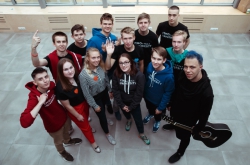Why did you decide to dedicate your projects to helping people with special needs?
Long ago in my childhood, when I was about four, I first saw deaf-blind people communicate. I don’t recall where that happened exactly, but this moving image has stayed in my mind ever since. I was introduced in programming in my ninth grade and immediately decided to use my newly-acquired skills to do something good. Not for creating yet another game which will fizz out in a week and be swept under the carpet, but something that would really matter. And it was then that this vivid childhood memory came back to me once again.
I thought long and hard about how modern technologies can allow people with special needs overcome their communication barriers. Help came from where I least expected it to: my favorite film, Christopher Nolan’s ‘Interstellar’. There is this moment when the protagonist attempts to transmit information from a black hole by using the Morse code. So I decided to base my project on this coding technology: after the information is entered in the app, the latter transforms it to Morse code and relays it to a deaf-blind recipient through the vibrations of a smart-watch device. Vice versa, deaf-blind people can communicate by tapping on the screen of the device. I called it ‘Life Feel’.
I took this app to practically all the scientific conferences in my home region of Bashkortostan, receiving scores of accolades and first places. I also won ‘My First Business’, a prestigious contest organized by the Plekhanov Russian University of Economics, which came with a 500,000 roubles worth of money prize that I used for buying a new computer to continue developing my project.
Did you write the app yourself?
Of course. My dad is a skilled programmer who works for Sberbank, but he never taught me his line of trade, saying that I have to work for my own successes.
Did your schoolmates and teachers congratulate you on your accomplishments?
They didn’t like me very much, to be honest. Because of my active participation in various scientific events, I often missed my classes, and that was frowned upon. When I was in the tenth grade, each teacher’s meeting included discussions on to punish me for such trespasses. The computer science teacher, who was my only ally, told me that the other staff used to really dig up on me to bring me to book. There were even threats of expulsion.

Why would teachers treat me that way? I studied in a small, provincial school that didn’t want to stand out and snubbed the students who did. It was only a year ago that my teachers would say, ‘Do you think someone in Moscow will care about your gizmos?’ And this was because I was invited to a final round of ‘Junior’, a prestigious contest organized by the Moscow Engineering Physics Institute for promising school students. The rules of the contest stipulated that I had to be accompanied by an adult to attend. After much commotion, my dad managed to get some time off work to follow me to Moscow. We went, and I won. When I came back to school, they dragged me into a classroom full of teachers, and they gave me a standing ovation. Then I realized: this is it.
After this success, I was approached by Connection, a deafblind support foundation located in Moscow. I work in close cooperation with them now; it is thanks to Connection that I get to test my apps.
That Moscow trip isn’t one I will forget so easily. I was put in truly spartan conditions: think bleak Moscow suburbs, austere dorms, a testing one-hour commute to the university.
Was that hard?
No, not really. As experience shows, the worse my surroundings are, the better the ideas I come up with. It really sets my critical thinking in motion. When you don’t have enough money for food, your brain can only think of how to earn some money to afford a meal. Maybe that explains why I’m so thin.
I’m only joking, though, I’m just built that way. Being an ex-karateka with a ten-year experience also helps. All throughout my childhood, I went through rigorous training to make my attacks quicker and more impactful. I came on top in many a national competition and got to the brown belt stage; I had to wait till I was 18 to be eligible for a black one, but decided to quit karate when I was 16. It didn’t go well with my studies, and studying was my number-one priority, as it always will be.

How do you like your ITMO University studies, then?
There’s nothing about it that I don’t like. Each professor has their own individuality, it’s the same with my fellow students. Everyone I meet here is very interesting in their own way, so I really enjoy talking to them.
St. Petersburg is the ideal place for studying. It’s calm in here, and the weather is perfect for us programmers: you don’t risk venturing outside and stay at your comfortable, toasty home instead.
When I just graduated from school, one big company tried to headhunt me, but I immediately refused: they only wanted to hire me on a full-time basis, which didn’t leave me any opportunity to continue my studies. It was an enticing offer, though: the job in question came with a 200,000-rub monthly salary. But I don’t regret my decision even a bit.
What next for your project?
Very soon I’m leaving for Moscow to attend the finals of an influential European contest called Social Impact Award. I’ve been a participant for the past six months and am now going to make a final presentation for my second project LifeTalk, which is an app for helping people learn the sign language.

This app fills an empty niche on the market, so I’ve already pitched it to companies in the b2b and b2c sectors. In the US, for example, many leading companies like Starbucks are actively hiring people with hearing and speech disabilities and sign language specialists to accommodate people with special needs in their cafes.
My initial concept was way more ambitious: I wanted to make a full-fledged online sign language translator. You would point your phone camera at a person communicating with signs, and the app would translate them to words. My invention would make it possible for everyone to interact with the hearing-disabled. But after discussing it with companies and other startupers, I understood that the world isn’t ready for such a technology yet, so I’ll wait.
It also involved too much responsibility for one person, I wouldn’t have managed it on my own. My friends said that there is nothing for it in Russia and I should go the Silicon Valley to work on this project. Who knows; maybe I will.





